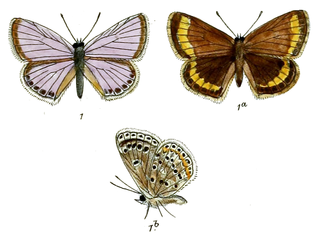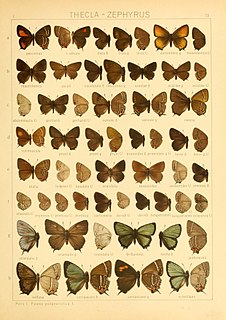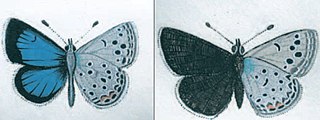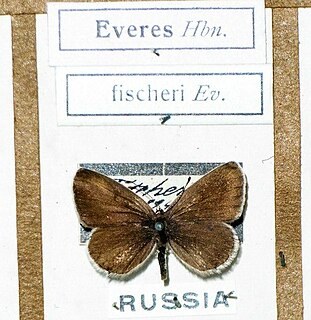
Plebejus is a genus of butterflies in the family Lycaenidae. Its species are found in the Palearctic and Nearctic realms.

Alpherakya is a Palearctic genus of butterflies in the family Lycaenidae.
Apangea is a genus of butterflies in the family Lycaenidae. The genus is monotypic containing the single species Apangea pang endemic to Tibet and West China. This species is sometimes placed in Lycaena.

Athamanthia is an Eastern Palearctic genus of butterfly in the family Lycaenidae. Athamanthia is differentiated from Lycaena by characters of the male genitalia.

Lysandra is a genus of butterflies in the family Lycaenidae.

Pamiria is a Palearctic genus of butterflies in the family Lycaenidae.

Patricius is a Palearctic genus of butterflies in the family Lycaenidae.

Tongeia is a Palearctic genus of butterflies in the family Lycaenidae found in temperate East Asia. Most species are endemic to China and many species are recently described from China. The best known species is the more widely distributed Tongeia fischeri.

Turanana is a genus of butterflies in the family Lycaenidae. It is found in the east Palearctic from Greece to Central Asia.

Neolycaena rhymnus is a butterfly of the family Lycaenidae. It is found from Ukraine and southern and central Russia to the southern Ural mountains, Zauralye, the western and southern Altai Region, the Sayan mountains and Kazakhstan. Seitz gives this description - T. rhymnus Ev.. Tailless, the wings brown above and beneath. The underside irrorated with numerous white short dashes, which are partly placed in rows and partly irregularly dispersed. — In South Russia, South Siberia to the Altai, in May and June, on steppes.

Turanana cytis, the Persian odd-spot blue, is a butterfly of the family Lycaenidae. It was described by Hugo Theodor Christoph in 1877. It is found in Turkey, the Kopet-Dagh and Iran.

Turanana endymion, the odd-spot blue or Anatolian odd-spot blue, is a butterfly of the family Lycaenidae. It was described by Christian Friedrich Freyer in 1850. It is found in Turkey, Lebanon and Iran. Records from Europe refer to Turanana taygetica.
Turanana taygetica is a butterfly of the family Lycaenidae. It was described by Rebel in 1902. It is found in Greece and Turkey.

Tongeia fischeri, or Fischer's blue, is a butterfly of the family Lycaenidae. It was described by Eduard Friedrich Eversmann in 1843. It is found in south-eastern Europe, the southern Ural, northern and eastern Kazakhstan, south-western and southern Siberia, the Russian Far East, Mongolia, China, Korea and Japan.
Polyommatus zarathustra, the Zarathustra blue, is a butterfly of the family Lycaenidae. It was described by Eckweiler in 1997. It is endemic of southern slope of the Meghri Mountains in Armenia and nearby Arasbaran Mountains in northern Iran. Armenia is inhabited by subspecies P. z. neglecta. It inhabits forests alternated with dry steppe-like areas at elevations of 1400–1900 m above sea level. The species is included in the Red Book of Animals of the Republic of Armenia as endangered EN B1a+B2a.
Polygonia undina is a butterfly of the family Nymphalidae first described by Grigory Grum-Grshimailo in 1890. It is found from Ghissar-Darvaz to the Pamirs-Alai and Tian-Shan in north-western China and the Himalayas.

Agriades pheretiades, the Tien Shan blue, is a Palearctic butterfly of the family Lycaenidae.
Rimisia miris is a species of butterfly in the family Lycaenidae. It is the sole representative of the monotypic genus Rimisia.
Grumiana is a genus of butterflies in the family Lycaenidae erected by Alexander Borisovich Zhdanko in 2004. It is monotypic, containing only the species Grumiana berezowskii first described by Grigory Grum-Grshimailo in 1902. It is found in Sichuan, China.











